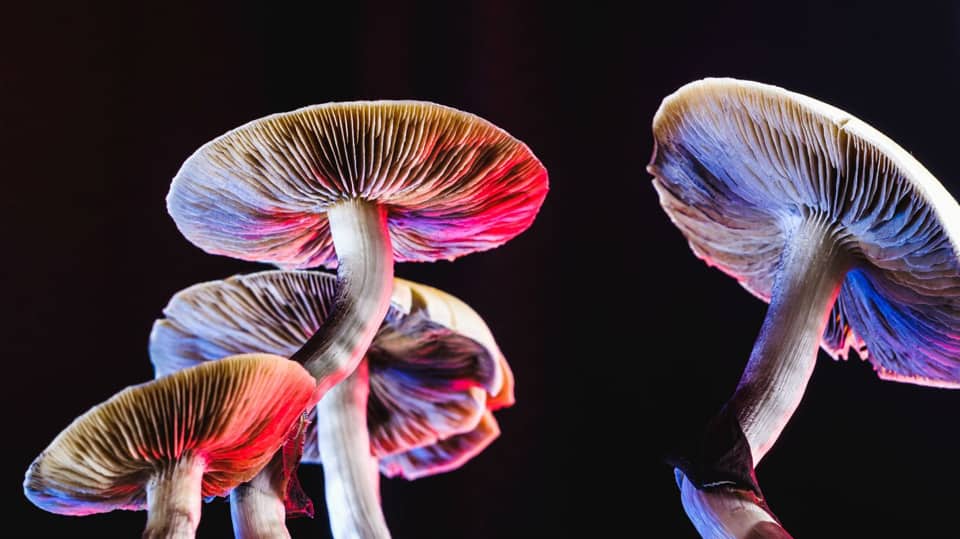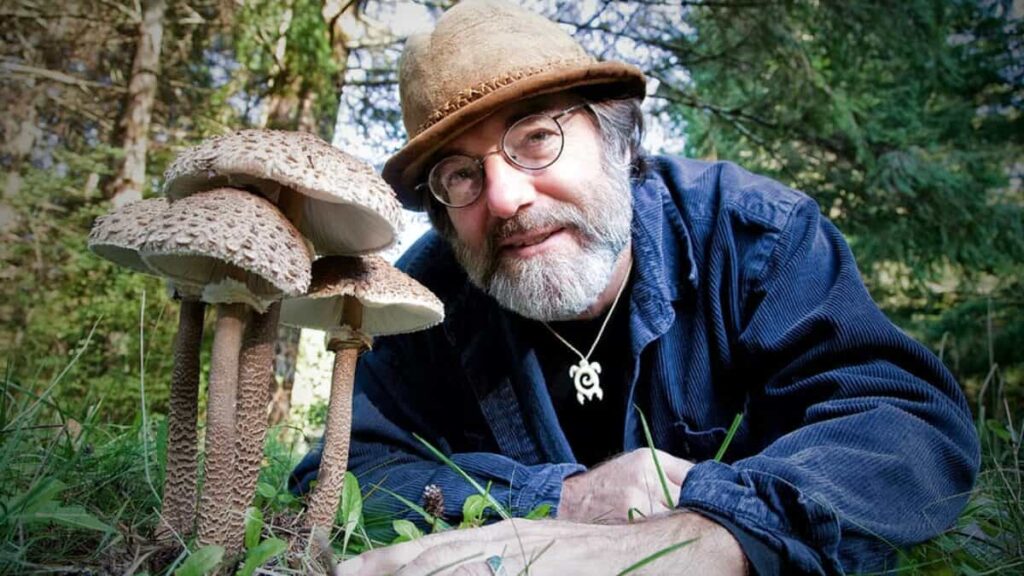
Is Microdosing the New Preworkout? The Surprising Symbiosis of Microdosing and Fitness
For the eager minds of the fitness world, discovering fresh ways to elevate their workout game is akin to furthering your journey. Microdosing, a
The “Stoned Ape” Theory is an affectionate nickname given to an evolutionary idea developed by Terence and Dennis McKenna. The theory presupposes that psilocybin mushrooms, also known as “magic” mushrooms, played a significant role in human evolution.
While many people don’t know that magic mushrooms can be useful for more than their psychedelic benefits (which is what led to the theory being rebranded as the Stoned Ape theory), scientists and serious psychedelic advocates now recognize that they can be immensely beneficial for improving physical and mental capabilities in human beings and other species.
Terence and Dennis – as well as present-day mycologist Paul Stamets – all believe that these mushrooms may have played a significant role in the development of human consciousness. This article will explain how and why this might have been possible.
The stoned ape theory, developed by Terrence and Dennis McKenna, postulates that human beings underwent a radical transformation in their evolution thanks to magic mushrooms.

Around 200 million years ago, human beings experienced a significant leap in intelligence. This change marked the transition from early hominid to modern humans and necessitated a significant increase in cognition, skill, and intelligence.
According to a paper penned by authors including Dr. Michael Winkelman of Arizona State University, “hominin evolution occurred in an ever-changing, and at times quickly changing, environmental landscape and entailed advancement into a socio-cognitive niche.” In other words, the challenge of survival created a need for greater intelligence, cooperative communications, and social learning.”
During this period, the brain tripled in size in a relatively short period of time that can’t be accounted for with evolution as we understand it. Something significant influenced humanity around this time to cause a rapid change in their evolutionary progress. Terence and Dennis McKenna believe that this influence may have been psilocybin, a psychedelic alkaloid found in magic mushrooms.

But why would psilocybin influence people so much at this time? Magic mushrooms have been around for much longer than people have. Wouldn’t people have been eating them beforehand?
The McKennas assert that the changes in the African environment would have caused this dietary change. As a result of desertification and the decreasing number of forests and vegetation in the area, humanity would likely have had to move from their African homeland. Terrence believes that they would have followed herds of cattle northwards, prior to their spread across Europe and throughout Asia.
Most psychedelic enthusiasts and mycologists are aware of the interesting fact that certain types of mushrooms prefer cow dung as a medium for growing. The stoned ape theory suggests that humans would have been excited at the prospect of trying a new delicacy that emerged from the excrement of the herd animals they followed to uncharted lands. This allowed them to introduce psilocybin into their diet for the first time.
“We know the brain tripled in size about 2 million years ago, and probably the ecosystems which put hominids, cattle and mushrooms together were around that old,” said Dennis McKenna, showcasing his detailed knowledge about the history of fungi and mammals.
If you’re not already familiar with Magic mushrooms, then by this point, you’re probably wondering why on earth anybody would continue eating mushrooms that grow in cow poop – unless there were some serious benefits. On the other hand, any mycophile or psychonaut will assure you that there are many benefits to consuming psychedelic mushrooms. These benefits can be helpful not only on an individual scale, but on a cultural level and, in this case, the level of an entire species.
There are lots of reasons that psilocybin would help a species develop. Some of these benefits would be even more useful back in the days of humanity two million years ago when we still thrived as hunters and gatherers.
The authors of the paper mentioned above describe the need for an increase in social learning, cooperation, and intelligence. These traits are all largely dependent on a neurotransmitter called serotonin, according to the authors. Serotonin is also the main neurotransmitter influenced by psilocybin.
Psilocybin also tends to enhance visual acuity and can increase sensory sensitivity. This would increase the ability of hunters to succeed in their efforts and would prime any groups to prepare for any potential threats.

The activation of serotonin also helps to prepare the brain for enhancing neuroplasticity. This would have allowed for the relatively rapid development of new brain cells, at least compared to previous generations.
Furthermore, the consumption of magic mushrooms would have also improved social cooperation. By producing euphoria and laughter as well as increased bonding among individuals, magic mushrooms can certainly strengthen a community. In addition, the sharp ncrease in libido attributed to magic mushrooms would also provide additional “evolutionary benefits,” according to McKenna.
Neither Terence nor Dennis really approve of the theory being branded as the “Stoned Ape” theory. They say that it’s a misnomer that does nothing to support the validity of the theory. Dennis believes that it misrepresents the idea and devalues the possibility of psilocybin having had a significant impact on human evolution.
The theory doesn’t just suggest that the apes were getting high. In fact, it doesn’t really suggest that at all. It suggests that all of the consumption of psilocybin was important for the survival of the species. Early humans didn’t have any time to sit around and get high as we do nowadays. Instead, they would have eaten the mushrooms solely to help provide an evolutionary advancement.
Terence McKenna believes that the mushrooms led to the development of language, or more specifically, “changes in the language-forming area of the brain.” He also believes that the mushrooms led to the development of self-reflection.
Despite McKenna’s assertion that the theory is valid, there isn’t actually any evidence that suggests that early humans consumed mushrooms at all, let alone magicones. Most of the evidence referenced by the McKennas amounts to a few cave paintings that showcase what they believe to be mushrooms, and their own plausible-sounding theories.
And while it’s certainly true that mushrooms could have enhanced social bonding and capabilities among early humans, we “will forever remain uncertain,” agrees Terence.
However, in recent years, world-famous mycologist Paul Stamets has also lent his agreement to the stoned ape hypothesis. He first publicly stated his approval while giving a talk entitled “Psilocybin Mushrooms and the Mycology of Consciousness,” which he delivered at the scientific conference “Psychedelic Science 2017.”

“I present this to you because I want to bring back the concept of the Stoned Ape Hypothesis,” Stamets said, referring a fact stated earlier in this article. “What is really important for you to understand is that there was a sudden doubling of the human brain 200,000 years ago. From an evolutionary point of view, that’s an extraordinary expansion. And there is no explanation for this sudden increase in the human brain.”
“I suggest to you that Dennis and Terence were right on,” Stamets continues, although towards the end of his talk he agrees that the theory is still essentially unprovable although remains optimistic. “I want you or anyone listening, or seeing this, to suspend your disbelief … I think this is a very, very plausible hypothesis for the sudden evolution of Homo sapiens from our primate relatives.”
Is the stoned ape theory something that we should take seriously? There’s not really any way to know for sure at this moment, but it could provide a plausible explanation for the sudden expansion of human intelligence and the size of the early hominid brain.
Though a few cave paintings don’t serve as sufficient evidence to prove the theory, anthropology and other sciences may shine light on this issue. And if it wasn’t magic mushrooms that led to the rapid evolution of the human species, we’re left with theories that are a lot less easy to contend with such as aliens and divine intervention.

For the eager minds of the fitness world, discovering fresh ways to elevate their workout game is akin to furthering your journey. Microdosing, a

We rarely find a more revered, appreciated, treasured, and prized natural resource in the world other than Psilocybe Cubensis. Known by more names than we

What are Lysergamides? They are a class of compounds structurally similar to lysergic acid, the parent compound in the fungus ergot. People have used

Losing a job is one thing, but losing a business is in an entirely different league. Your own business is an extension of your own

Most entrepreneurs will tell you if you don’t have enough time, capital, mental fortitude etc., then starting a business may not be the right path

All you need to know before starting your journey to microdosing LSD – The ultimate guide. ‘LSD is just a tool to turn us
GET 10% DISCOUNT WITH NOTIFIED ABOUT THE LATEST NEWS AND UPDATES. NO SPAM, WE PROMISE!
FREE Tracked shipping on orders over €250 to EU countries.
Monday- Friday 8.30am- 5pm (CET)
A range of options available
Guaranteed delivery or your money back